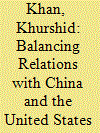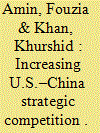| Srl | Item |
| 1 |
ID:
162451


|
|
|
|
|
| Summary/Abstract |
It is always a risky affair, especially for a weak state to strike the right balance while
dealing with two great powers having serious conflicting interests in a particular
region. For a country like Pakistan which remains dependent on foreign aid, running
an independent foreign policy seems quite difficult. While Pakistan’s relations with
China continued to remain smooth throughout history, its relations with the United
States has been more of a roller coaster than a smooth ride but still both could never
be too apart from each other because of various compelling reasons. Currently,
China and Pakistan are extensively engaged in promoting their mutual economic
and strategic interests that go against the U.S. interests. Therefore, in the case of a
possible conflict between United States and China, Pakistan might be trapped in
a catch-22 because it cannot afford to infuriate the United States beyond certain
limits. In such a trap, staying neutral might be even riskier. Slow and steady change
in the status of Gilgit–Baltistan beyond a certain level for promotion of the China–
Pakistan Economic Corridor (CPEC) would also be a serious trap. Pakistan could
afford to lose economic benefits of the CPEC but it cannot afford to give up its
claim over Kashmir which remains the “lifeline” for its survival. Pakistani Generals
fighting on exterior fronts must therefore, make smart moves to ensure that at no
stage should Islamabad be compelled to put all its eggs in one basket.
|
|
|
|
|
|
|
|
|
|
|
|
|
|
|
|
| 2 |
ID:
154939


|
|
|
|
|
| Summary/Abstract |
Historically, China had been a great power and had maintained the largest economy
in the world for quite a long time. It would, therefore, like to regain its lost status.
There is consensus among many scholars that China would rise peacefully by
adopting the five “principles of peaceful co-existence”, thus, it would take a leading
role in the 21st century. It is viewed that the United States is already convinced to a
great extent that it might not be able to maintain sole dominance for too long in the
backdrop of the rising Chinese economic and military power. Based on an in-depth
analysis of the issue, the study concludes that China would avoid clashing with
Washington and its allies while protecting its economic interests across the globe.
Nevertheless, the Chinese would react if their core interests are threatened by the
United States and its allies including India. In order to protect its long-term interest
in the region and beyond, China would gradually develop its military including its
maritime capabilities to increase its influence beyond China’s periphery. However;
it is highly unlikely that in the near future, China would contest the United States
and its allies beyond the South China Sea. The study also concludes that in this
great ongoing game between the quadrangles of the countries, if India makes a
principle decision to stand by the United States in the case of a conflict with China
over the Indian Ocean, such a scenario would limit Pakistan’s options to either join
China or stay neutral. Either of the two options would pose a serious challenge for
Pakistan. A decision to stay outside the Great Powers’ power politics would be even
more difficult.
|
|
|
|
|
|
|
|
|
|
|
|
|
|
|
|